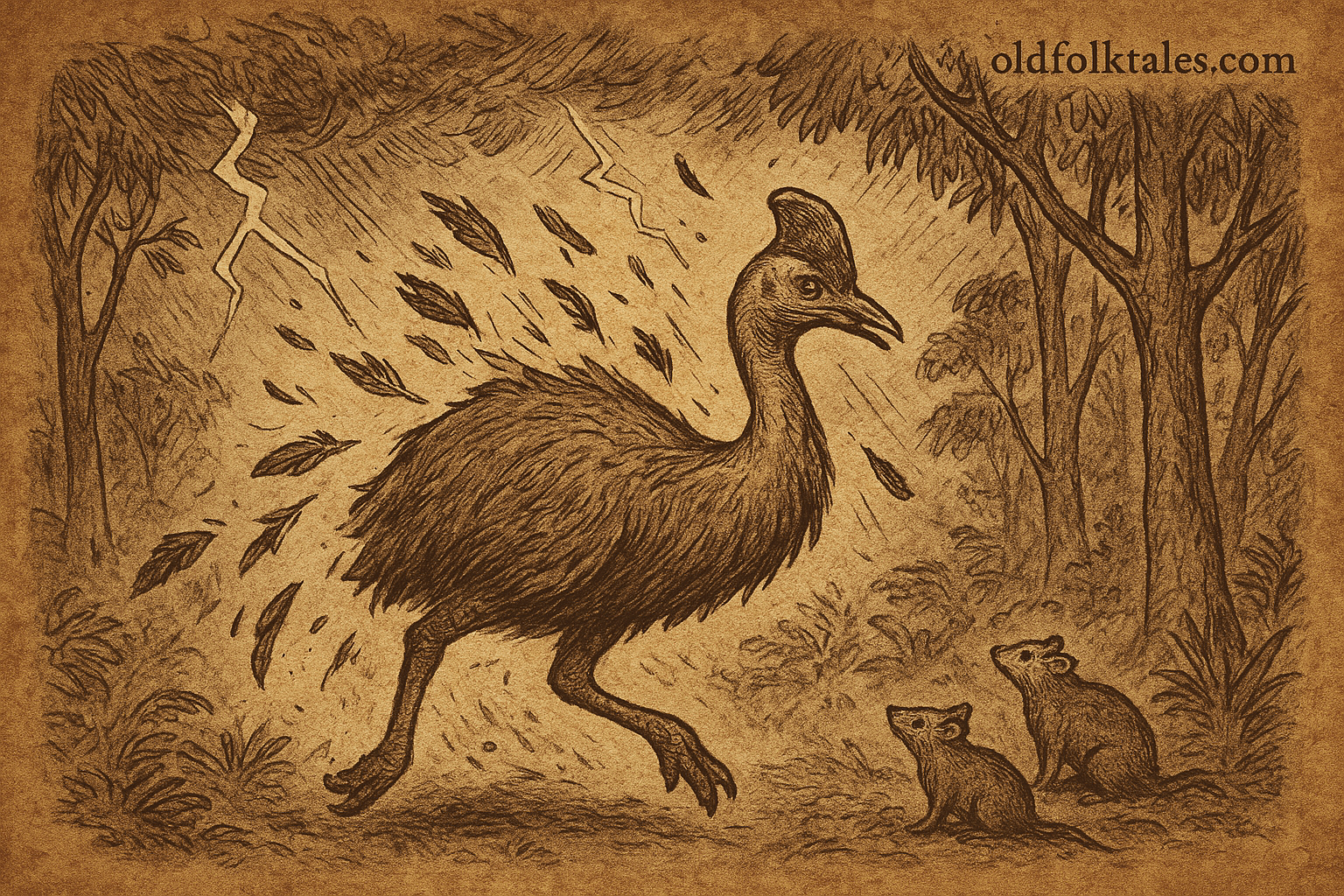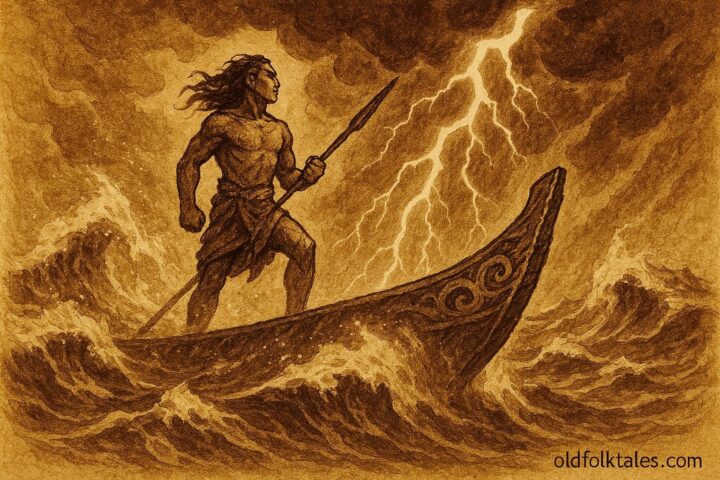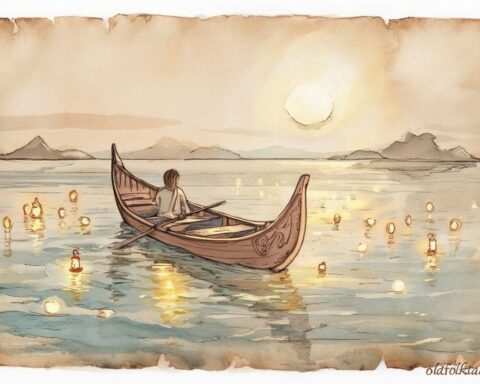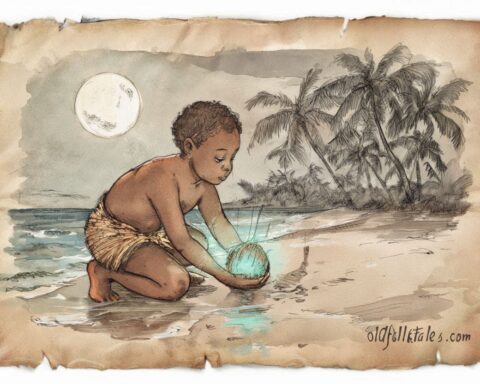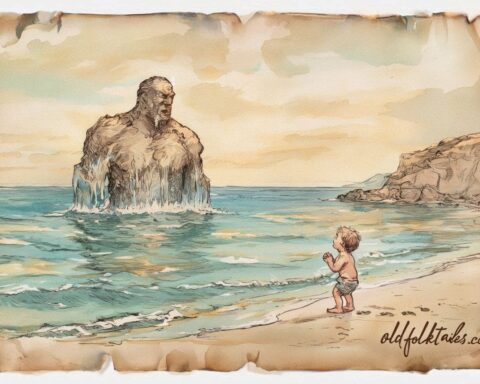In the time before memory, when the world was still learning its shape and the mountains of Papua New Guinea touched the clouds with reverence, there lived a magnificent cassowary unlike any creature that walks the earth today. Her wings stretched wide and powerful, catching the morning light like sheets of hammered copper. When she spread them across the highland valleys, her shadow fell upon entire villages, and her feathers gleamed with colors that rivaled the birds of paradise themselves.
She was the queen of the skies in those ancient days, soaring effortlessly above the dense rainforests that blanketed the Chimbu and Morobe highlands. From her lofty heights, she could see everything the winding rivers that carved through the valleys like silver threads, the gardens where people cultivated their taro and sweet potato, the pigs rooting in the undergrowth, and the dogs that followed the hunters through the forest paths. And as she watched these earthbound creatures struggling below, something cold and hard began to grow in her heart.
Click to read all Melanesian Folktales — rich oral storytelling from Papua New Guinea, Fiji, Solomon Islands, and Vanuatu
Pride, like a seed planted in fertile soil, took root and flourished.
The cassowary began to mock those who could not fly. When she passed over a hunting party struggling through the muddy forest floor, she would call down with a voice like thunder, “Look at you, crawling like insects! I am free while you are bound to the dirt!” When dogs barked at her shadow, she would laugh and say, “Bark all you want, groundlings! You’ll never know the joy of the wind beneath your wings!”
The pigs, with their patient wisdom, simply grunted and returned to their rooting. The dogs, loyal and true-hearted, continued their work alongside the hunters. But the cassowary’s words cut deep into the hearts of many who heard them, leaving wounds that ached like thorns embedded in flesh.
One day, as the cassowary soared high above a narrow mountain path, she spotted a figure stumbling along the rocky trail. It was a traveler, a man from a distant village who had lost his way while journeying to visit his family. His skin hung loose on his bones, and his legs trembled with each step. He had been walking for days without food, and hunger had drained the strength from his body like water seeping from a cracked clay pot.
When he heard the great wings beating overhead, the man looked up with desperate hope lighting his hollow eyes. He raised his trembling arms and called out, his voice barely more than a whisper carried on the mountain wind: “Great cassowary! Beautiful bird of the highlands! Please, I am dying of hunger. If you could guide me to food, or bring me even a single fruit, I would be forever grateful. My children wait for me in the next valley, and I fear I will never see them again.”
The cassowary circled lower, close enough that the man could see the magnificent patterns on her feathers and the fierce intelligence in her eyes. For a moment, something flickered there perhaps a shadow of compassion, perhaps a memory of gentler days. But pride had grown too strong in her heart, choking out all softer feelings like weeds strangling a garden.
She threw back her head and laughed, a harsh sound that echoed off the mountain walls. “Why should I help you, crawler? You with your weak legs and your earthbound ways? I am a creature of the sky, born to soar above your troubles. Find your own food, if you can!” And with a powerful thrust of her gleaming wings, she rose higher into the air and disappeared beyond the ridge, leaving the man alone with his despair.
But the cassowary’s cruelty did not go unnoticed.
Deep in the heart of the rainforest, where the oldest trees twisted their roots around stones that remembered the world’s beginning, the Spirit of the Forest watched. This ancient presence, older than mountains and wiser than rivers, saw everything that happened within the green cathedral of the highlands. The Spirit had witnessed the cassowary’s growing arrogance, had heard her mocking calls, and had hoped she might find her way back to kindness. But this final act of cruelty turning away from a dying man who begged for mercy could not be ignored.
The Spirit rose from the forest floor like mist at dawn, taking no single shape but filling the air with a presence that made every creature pause and listen. The wind carried its voice through the valleys, speaking words that hummed in the bones of all who heard: “Pride that lifts itself above compassion shall be brought low. Wings that refuse to serve others shall serve no more.”
In that instant, the cassowary felt a terrible change begin.
Her magnificent wings, which had carried her so effortlessly through the mountain air, began to shrivel. The broad flight feathers that had caught the wind now shortened and stiffened, transforming into strange, hair-like quills that could no longer bear her weight. Her body, once perfectly balanced for flight, grew heavy and dense. Her legs thickened and strengthened, but not for soaring for walking, for the very earthbound existence she had so cruelly mocked.
She felt herself falling, tumbling from the sky like a stone, and though she beat her useless wings frantically, she could not stop her descent. She crashed through the canopy, breaking branches, and finally struck the forest floor with a thunderous impact that shook the earth.
When she struggled to her feet, the world looked different from ground level. The forest that had seemed so small from above now towered over her, vast and shadowed and full of hidden dangers. She tried again to fly, leaping and flapping her transformed wings, but she could rise no higher than a child could jump. The sky that had once been her kingdom was now forever beyond her reach.
From that day forward, the cassowary walked the earth. She still carries herself with a proud bearing, her head held high, but she can never again look down on others from the heights. She stalks through the highland forests on powerful legs, earthbound like all those she once mocked, a living reminder that pride without compassion is not strength but weakness, and that those who lift themselves above others through cruelty will find themselves brought low.
And they say that sometimes, on quiet mornings in the Chimbu and Morobe highlands, you can still hear the cassowary’s call echoing through the valleys not the mocking laugh of ancient days, but a deeper, sadder sound that speaks of lessons learned too late and wings that will never again catch the wind.
Explore tales of ancestral spirits and island creation that connect people to the land and sea
The Moral of the Story
This ancient tale from Papua New Guinea teaches us that pride blinds the heart while compassion lifts the soul. True strength lies not in what we possess or how high we can rise, but in how we treat others, especially those who are vulnerable and in need. When we use our gifts to mock rather than help, when we place ourselves above others rather than extending a hand to lift them up, we diminish ourselves more surely than any punishment could. The cassowary’s fate reminds us that our greatest power comes not from standing alone at the heights, but from standing together on common ground.
Knowledge Check
Q1: Why could the cassowary fly in the beginning of the Papua New Guinea story?
A1: In the earliest days of the world, the cassowary possessed wide, powerful wings that allowed her to soar across the highland valleys like an eagle. She was the queen of the skies, with gleaming feathers and the ability to fly effortlessly above the forests of the Chimbu and Morobe regions, unlike the flightless cassowary we know today.
Q2: What was the cassowary’s main character flaw in this highland folktale?
A2: The cassowary’s fatal flaw was her overwhelming pride and arrogance. She mocked earthbound creatures including pigs, dogs, and humans, considering herself superior because of her ability to fly. This pride made her cruel and prevented her from showing compassion to those in need, ultimately leading to her punishment.
Q3: Who was the traveler that the cassowary refused to help?
A3: The traveler was a starving man who had lost his way while journeying through the mountains to visit his family. He was near death from hunger and exhaustion, desperately begging the cassowary for guidance to food or even a single fruit. The cassowary’s refusal to help this dying man triggered the Spirit of the Forest’s intervention.
Q4: What does the Spirit of the Forest represent in Papua New Guinea mythology?
A4: The Spirit of the Forest represents the ancient, watchful presence that maintains balance and justice in the natural world. This spiritual entity, older than the mountains themselves, observes the behavior of all creatures and ensures that cruelty and pride are answered with appropriate consequences. It embodies the moral order of the highlands’ ecosystem.
Q5: How did the cassowary’s physical transformation reflect her spiritual punishment?
A5: The cassowary’s wings shriveled into useless, hair-like quills, her feathers hardened, and her body became too heavy for flight. This physical transformation directly mirrored her spiritual failing just as she had refused to use her gift of flight to help others, she lost that gift entirely. She became earthbound like those she had mocked, forced to walk the forest floor forever.
Q6: What is the cultural significance of the cassowary in Papua New Guinea highlands traditions?
A6: In the Chimbu and Morobe highlands cultures, the cassowary is an important creature both practically and symbolically. This legend explains why cassowaries cannot fly despite being birds, while teaching crucial lessons about humility, compassion, and community responsibility. The story serves as a moral guide, reminding people that pride and cruelty lead to downfall, while kindness and helping others represent true strength.
Source: Adapted from oral narratives collected in Papua New Guinea Legends and Myths (Department of Education, Port Moresby, 1973) and similar regional tellings recorded in the Morobe Folklore Collection (ANU Pacific Manuscripts Bureau, Reel PMB 136).
Cultural Origin: Chimbu and Morobe Highlands, Papua New Guinea
